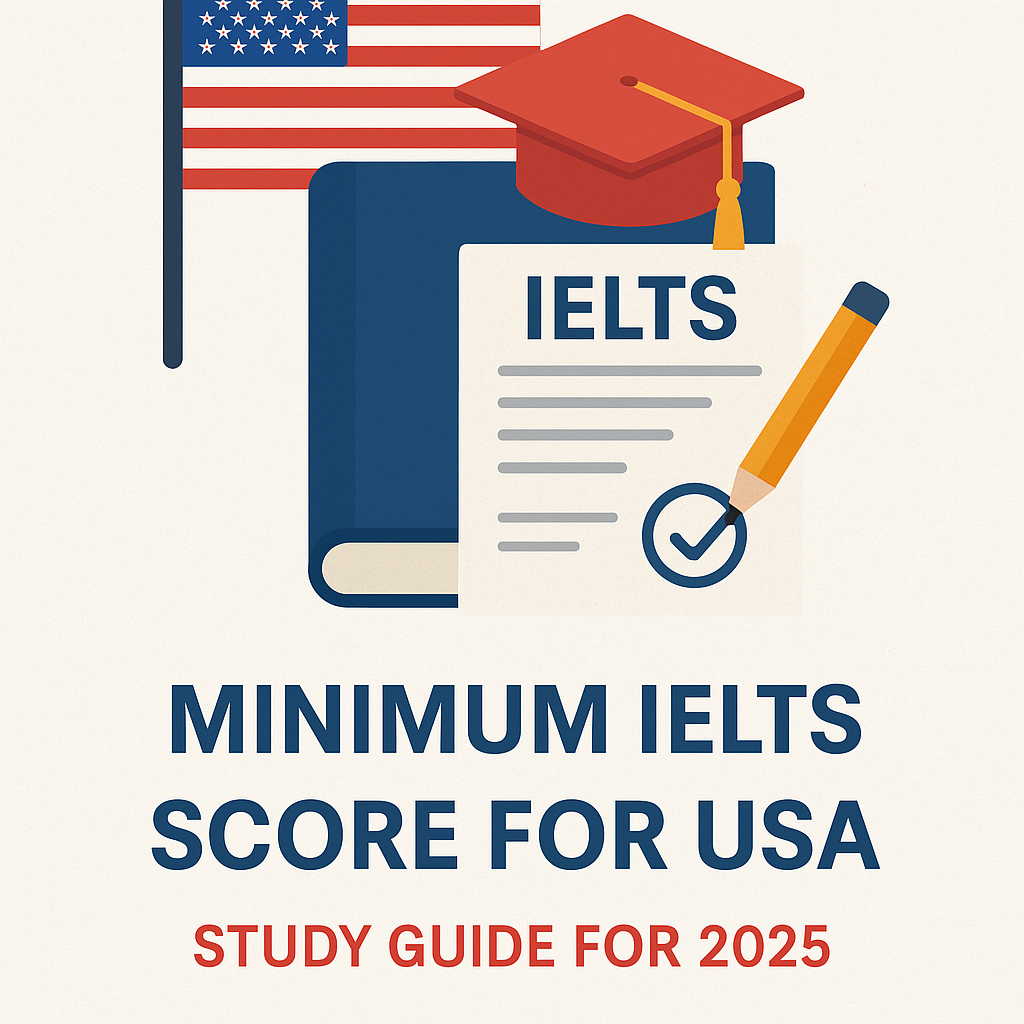
The United States continues to be one of the most sought-after destinations for international students. Known for its world-class universities, diverse culture, and abundant career opportunities, the USA attracts thousands of students from across the globe each year. If you are one of them, chances are you’re already preparing to prove your English proficiency—and one of the most recognized ways to do that is through the IELTS (International English Language Testing System) exam.
But what IELTS score do you really need to study in the USA? Is there a fixed cut-off? And how can you aim for the best results to secure admission in top-ranked universities? In this blog post, we’ll explore everything you need to know about the minimum IELTS score for the USA, including:
- What is the IELTS?
- Why IELTS is important for the USA
- General IELTS score requirements
- Top USA universities and their minimum IELTS scores
- IELTS score for student visa
- Score requirements by program type (undergraduate, postgraduate, etc.)
- Tips to score high in IELTS
- FAQs related to IELTS and US admissions
Let’s dive in.
What is IELTS?
The International English Language Testing System (IELTS) is a standardized English language proficiency test accepted by over 11,000 organizations globally, including universities, employers, immigration authorities, and professional bodies. It evaluates candidates across four key language skills:
- Listening
- Reading
- Writing
- Speaking
The IELTS is scored on a 9-band scale. Each band corresponds to a level of English proficiency, from Band 1 (“Non-user”) to Band 9 (“Expert user”). The overall score is the average of the four sections, rounded to the nearest half or whole band.
Why IELTS is Important for Studying in the USA
Though the TOEFL has traditionally been more common in the U.S., IELTS is now accepted by over 3,400 institutions in the USA, including Ivy League universities and public colleges. Many students find IELTS more approachable than TOEFL because:
- It offers more flexible test dates and locations.
- The speaking section involves a real person, not a computer.
- The accent and context used in the listening and speaking sections are often considered more familiar to non-native English speakers.
Moreover, U.S. immigration and visa authorities also accept IELTS scores when processing student visa applications (F-1 Visa).
What is the Minimum IELTS Score Required for USA Universities?
There is no single minimum IELTS score that applies to all U.S. universities. Each institution sets its own English language requirements depending on the program, level of study, and course type.
However, here’s a general guideline:
| Level of Study | Minimum IELTS Score |
|---|---|
| Undergraduate | 6.0 – 6.5 overall |
| Postgraduate | 6.5 – 7.0 overall |
| Doctorate | 7.0+ |
| Community Colleges | 5.5 – 6.0 |
It’s also important to note that many universities have sectional requirements, meaning you must achieve a minimum score in each of the four sections.
IELTS Score Requirements for Top U.S. Universities
Let’s look at some popular U.S. universities and their minimum IELTS score requirements:
1. Harvard University
- Minimum IELTS: 7.0 (overall)
- Sectional minimums: Some departments may require 7.5+
2. Massachusetts Institute of Technology (MIT)
- Minimum IELTS: 7.0+
- Notes: Graduate programs may require higher scores
3. Stanford University
- Minimum IELTS: 7.0 (overall)
- Graduate Engineering: May require 7.5
4. University of California, Berkeley
- Undergraduate: 6.5 – 7.0
- Postgraduate: 7.0+
5. Columbia University
- Minimum IELTS: 7.0+
- Notes: Some programs accept conditional admission with lower scores
6. University of Michigan – Ann Arbor
- Undergraduate: 6.5 minimum
- Graduate: 7.0 – 7.5
7. New York University (NYU)
- Undergraduate: 7.0
- Graduate: Varies by program
IELTS Score for USA Student Visa (F-1 Visa)
To get an F-1 Student Visa, the U.S. Embassy/Consulate doesn’t specify an exact IELTS score. However, your visa approval largely depends on your admission to a SEVP-approved institution, which will have its own IELTS requirement.
Here’s what matters for your visa:
- Admission Letter: You must be accepted into a U.S. university/college.
- I-20 Form: Provided by your university after admission.
- Proof of English Proficiency: IELTS score meeting the university’s threshold.
In short: Meet your university’s IELTS requirement, and you’ll meet the visa requirement too.
IELTS Requirements by Program Type
1. Undergraduate Programs
Most U.S. colleges and universities offering undergraduate degrees require:
- Minimum IELTS Score: 6.0 – 6.5
- Sectional requirements: Some may require a minimum of 5.5 in each module
2. Postgraduate (Master’s) Programs
Graduate programs often require:
- Minimum IELTS Score: 6.5 – 7.5
- Sectional requirements: Commonly 6.0 in each band
3. Doctorate Programs (PhD)
- Minimum IELTS Score: 7.0+
- Some research-focused programs demand higher proficiency for academic writing and presentations.
4. Pathway Programs
If you fall short of the required IELTS score, many U.S. universities offer “Pathway” or “Bridge” programs. These are pre-sessional courses to improve your English skills before starting your main degree.
IELTS Scores Accepted by Community Colleges in the USA
Community colleges are an affordable entry-point into U.S. education. These institutions are more flexible with English language requirements:
- Minimum IELTS Score: 5.5 – 6.0
- Many offer ESL programs or waive IELTS if you complete their English preparation course.
Examples:
- Santa Monica College: 5.5
- De Anza College: 5.5
- Valencia College: 6.0
Tips to Score High in IELTS for U.S. Admissions
Scoring well in IELTS requires smart strategy, practice, and focus. Here are some effective tips:
1. Understand the Format
Know what to expect in each section—timing, question types, and evaluation criteria.
2. Practice With Mock Tests
Take full-length practice exams to improve time management and build test-day confidence.
3. Strengthen Vocabulary
Read newspapers, academic articles, and listen to English news to build a rich vocabulary.
4. Work on Grammar and Sentence Structure
Grammatical accuracy is key, especially in writing and speaking.
5. Seek Feedback
Practice speaking and writing with an English tutor and get detailed feedback.
6. Use IELTS Prep Material
Refer to books like “The Official Cambridge Guide to IELTS” and “Barron’s IELTS Superpack.”
What If My IELTS Score Is Low?
If your score is slightly below the required level:
- Apply to universities with lower requirements or
- Join an ESL/Pathway program offered by the university.
If your score is significantly low:
- Retake the test after structured preparation.
Remember, the IELTS is valid for two years, so use it wisely.
Frequently Asked Questions (FAQs)
Q1. Is IELTS required for all U.S. universities?
Not all, but most U.S. universities require IELTS or another proof of English proficiency. Some may waive the requirement if:
- You studied in English for several years
- You’re from a native English-speaking country
Q2. Can I study in the USA with a 5.5 IELTS score?
Yes, especially at community colleges or through pathway programs. However, direct admission into top-tier universities may not be possible.
Q3. Is IELTS better than TOEFL for U.S. universities?
Both are accepted widely. Choose based on your comfort. IELTS may feel more natural to some students due to its conversational speaking test.
Q4. Can I get a scholarship with my IELTS score?
Yes! A high IELTS score can strengthen your application, especially for merit-based scholarships.
Q5. What is a good IELTS score for U.S. universities?
A score of 6.5 to 7.5 is generally considered competitive for most top-tier universities.
Final Thoughts
The IELTS exam plays a crucial role in determining your admission chances to U.S. universities. While there is no one-size-fits-all score, most institutions require a minimum of 6.0 to 7.0, depending on the level and program type. Higher scores increase your options, including access to better programs, scholarships, and faster visa processing.
Make sure to research your target universities, prepare thoroughly, and plan your test well in advance of application deadlines.
If you stay focused and consistent, getting a good IELTS score for your U.S. dream is absolutely within reach.








